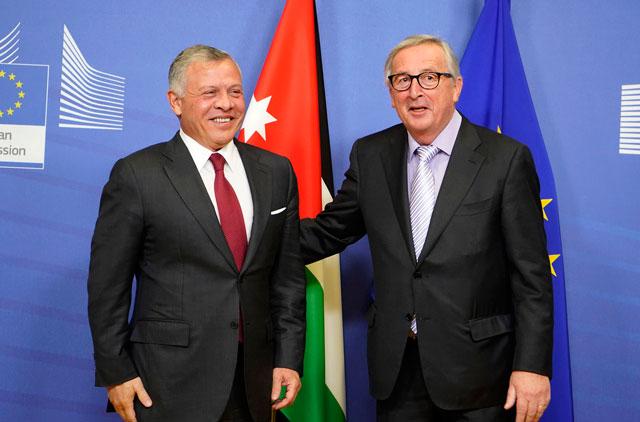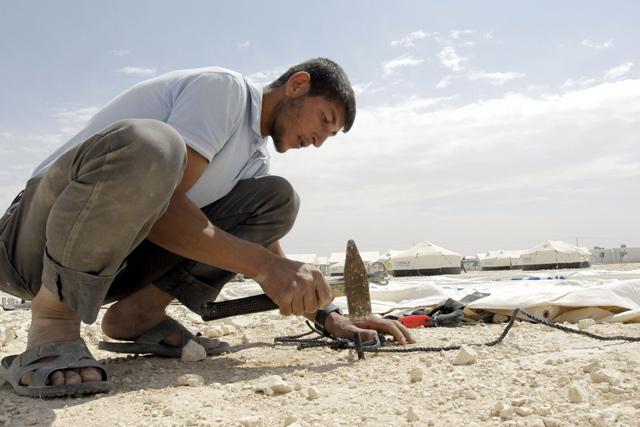You are here
Networking needed to benefit from new EU rules-of-origin deal
By Mohammad Ghazal - Dec 14,2018 - Last updated at Dec 14,2018

His Majesty King Abdullah meets with President of the European Commission Jean-Claude Juncker in Brussels on Wednesday (Photo courtesy of Royal Court)
AMMAN — Officials and experts on Thursday said an agreement reached between Jordan and the EU a day earlier to ease some requirements in the EU relaxed rules-of-origin deal will help the industrial sectors, but some time, effort and networking is needed to maximise the benefits.
Under a decision announced on Wednesday during His Majesty King Abdullah’s visit to Belgium, all factories in Jordan, regardless of their location, can benefit from the agreement that facilitates regulations for Jordanian products to be exported to Europe.
Under the original accord, the EU designated a total of 18 industrial and developmental zones as beneficiaries of the deal.
The new decision also extends the duration of the agreement till 2030, after it was previously set to end in 2026.
“The decision will greatly benefit industries in the Kingdom. It is an important step that will eventually help increase Jordan’s exports to the EU as the balance is largely in favour of the EU at the moment,” Yanal Barmawi, spokesperson of the Ministry of Industry, Trade and Supply, told The Jordan Times on Thursday.
“It will take a while before we start to witness tangible results, but this is very positive,” Barmawi added.
Jordan’s exports to the EU stood at $200 million in 2000 and rose to around $310 million in 2017, while imports from the bloc rose from $1.4 billion in to around $5.5 billion during the same period, the official noted.
“The ministry will hold meetings with industrialists soon to inform them about the changes made under the deal and will provide more details next week about the new understandings reached between the two sides,” he added.
Commenting on the new developments, President of the Textile, Garment and Clothing Union Fathalla Emrani said meetings should be held between EU businesses and Jordan’s industry sector representatives to explore potential opportunities.
“Industrialists need to know which products are in demand in individual European markets, as the EU markets differ from one another… All these amendments can be good if there is concrete networking between businesses to achieve tangible results,” Emrani told The Jordan Times.
He added that there is a need for properly informing factories about the requirements of Syrian refugees’ employment.
According to Barmawi, more details will be announced in this regard soon.
In the previous agreement, signed in 2016, if Jordanian industries were to benefit from the simplified rules of origin, each factory needed to hire Syrian employees to constitute no less than 25 per cent of its manpower.
Last month, however, Barmawi told The Jordan Times that Jordan reached an “initial understanding” with the EU to lower this ratio.
The Ministry of Planning and International Cooperation and the Jordan Labour Watch have said in previous remarks to The Jordan Times that factories were struggling to fulfil the employment clause due to “difficulty finding qualified Syrian workers” and “reluctance” of Syrians to obtain permits in fear of losing their rights as refugees.
As part of the original deal, manufacturers in Jordan can import up to 70 per cent of the raw materials used in production and still label the finished products as “Made in Jordan”, qualifying them for trade concessions.
Related Articles
AMMAN — Jordan has reached an "initial understanding" with the EU to ease some requirements in the EU relaxed rules of origin for Jordanian
AMMAN — Of nine companies that applied to the Ministry of Industry, Trade and Supply to export to Europe, six have been approved after compl
AMMAN — Studies for the establishment of the joint free Jordanian-Iraqi industrial zone at the border between the two countries have begun,













